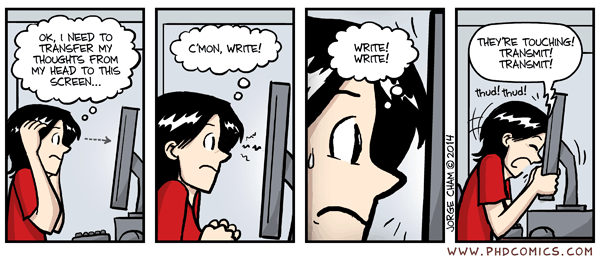Popular conceptions of what it means to write assume that knowledge of a subject is enough to produce a successfully written report on that subject or that knowledge of the rules of language, grammar, and mechanics is sufficient to create an effective piece of written communication (Tinburg, 76). If only it were that simple.
While the acquisition and application of writing knowledge are important, cognition alone can not guarantee success (Tinburg, 76). Let’s ponder writer’s block, temporary writer’s paralysis, and anxiety for a moment.

Threshold Concept four teaches us that all writers have more to learn. Threshold Concept five reminds us that our success can not hinge solely on our students’ abilities to produce well-written essays. We also want our students to demonstrate consciousness of the process that will enable them to reproduce success (Tinburg, 75).
The effective accomplishment of writing tasks over time requires metacognition, or the ability to perceive the very steps by which success occurs and to articulate the various qualities and components that contribute in significant ways to effective writing production (Tinburg, 76).
Metacognition refers to using a reflective thinking process to increase the awareness of one’s strengths and learning styles to improve the conscious control of learning and the ability to plan, monitor, and change own learning behaviors. In short, knowing what to learn and how to go about learning it (Cognitive Learning Strategies, n.d.).
Given the challenges of writing across disciplines, for varied audiences, and in diverse genres, metacognition is important because it allows writers to assess which skill and knowledge sets apply when one finds him/her/they self required to work in unfamiliar contexts or with forms with which they are unfamiliar.
Howard Tinburg
Metacognition must accompany cognition (Tinburg, 76).
Constructive metacognition involves “reflection across writing tasks and contexts, using writing and rhetorical concepts to explain choices and evaluations and to construct a writerly identity” (Gorzelsky et al.). Gorzelsky et al.’s concept of constructive metacognition is useful in that it points to the importance of reflection and the use of writing/rhetorical concepts—specifically genre, rhetorical situation, and writing process—within metacognitive moves (VanKooten, 3)
Reflection allows writers to recognize what they are doing in that particular moment (cognition), as well as to consider why they made the rhetorical choices they did (metacognition) (Takzac, 78).
How have you seen metacognition taught in your classes? How was it attached to a measurable learning outcome?
Citations
Center for Teaching and Learning at The University of Texas at Austin. (2012, Feb. 17). Brief Intro to Metacognition [Video]. YouTube. https://www.youtube.com/watch?v=mVE21QhY-lI&feature=youtu.be
Cognitive Learning Strategies. (n.d.). Retrieved from https://wit.edu/about/lit/engage/learning-strategies
Gorzelsky, Gwen et al. Metacognitive Moves in Learning to Write: Results from the Writing Transfer Project. Critical Transitions: Writing and the Question of Transfer. Ed. Jessie Moore and Chris M. Anson. Parlor Press/WAC Clearinghouse. Forthcoming. Print.
VanKooten, C. (2016). Identifying Components of Meta-Awareness about Composition: Toward a Theory and Methodology for Writing Studies.
Tinberg, Howard. “Metacognition is not Cognition.” Naming What We Know: Threshold Concepts of Writing Studies, edited by Linda Adler-Kasner and Elizabeth A. Wardle, Utah State University Press, 2016, pp. 75.